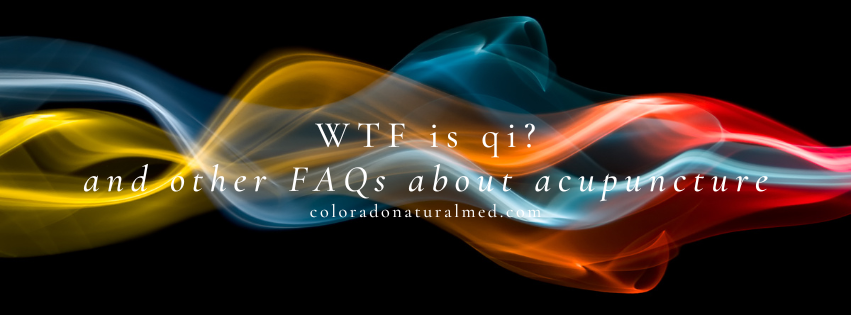
Acupuncture: those tiny needles, the mystical East Asian medical terms, the underlying energy…it’s no wonder you have questions! We are passionate about helping people understand and experience the benefits of acupuncture. So, let’s look at some of the most frequently asked questions and make some sense out of the ancient practice of acupuncture.
1. WTF is qi?
This is a big one! In East Asian Medicine, qi (pronounced “chee”) is the vital energy believed to flow throughout the body. It’s like the body’s internal electricity, keeping everything functioning smoothly. When qi becomes blocked or imbalanced, it’s thought to manifest as various health issues. Acupuncture aims to restore the flow of qi and promote overall well-being.
2. Where are you putting that needle?!?
Don’t worry; we aren’t just throwing needles around! East Asian Medicine has identified over 600 specific acupuncture points along your body’s meridians, which are the pathways for qi flow. These points correspond to different organs and internal systems in the body. Our acupuncturists have extensive training and experience to choose the most effective points to address your specific needs.
3. Does acupuncture hurt?
This is a common concern. The needles used in acupuncture are incredibly thin and flexible, much finer than a needle used for shots. While you might feel a slight pinch or ache upon insertion, most people describe the sensation as a dull ache or a feeling of heaviness. In fact, many patients find acupuncture deeply relaxing and even fall asleep during treatment! We prioritize your comfort and will always adjust the treatment based on your needs.
4. Chinese vs. Japanese Acupuncture: What’s the difference?
East Asian Medicine utilizes both styles of acupuncture to treat patients. While they share the same core core principles, there are some variations. The traditional Chinese acupuncture practiced by Dr. Adam Graves, ND, LAc, tends to use a wide range of techniques and might involve more needles with stronger stimulation. In Chinese acupuncture, there is a greater emphasis on both tongue and pulse diagnosis. Japanese acupuncture, practiced by Melissa Crum, LAc, on the other hand, often uses thinner, more delicate needles. A typical Japanese style acupuncture treatment is more gentle, uses more palpation, or diagnostic touching of the body, and often consists of two parts: a front and a back treatment. We incorporate elements from both styles to create a personalized treatment plan for each patient.
5. What is trypanophobia?
Needle phobia? No problem. We understand that needles can be a source of anxiety for some people. Trypanophobia is the fear of needles in a medical setting. At CNMA, we prioritize a gentle and calming treatment environment. We believe that the cause of most “dis-ease” comes from an underlying issue. We take the time to get to the root cause of your symptoms – including the fear of needles – to help you find long-lasting relief.
6. How many treatments do I need?
The number of acupuncture treatments needed varies depending on the individual and the condition being addressed. We typically recommend a series of weekly treatments for 4-6 weeks. The goal is to address underlying imbalances and shift patterns in your body’s energy flow for lasting results.
7. Do you offer acupuncture for kids?
Absolutely! Acupuncture can be a safe and effective treatment for children’s health concerns, from allergies and digestive issues to anxiety and sleep problems. We have special needles designed for children, and we tailor their treatment time to ensure a positive experience.
8. What if something feels uncomfortable during treatment?
Communication with your healthcare team is important. You are always in control of your treatment. If you experience any discomfort, simply let us know, and we will adjust the needle placement or technique accordingly. Your comfort and well-being are our top priority.
9. Does acupuncture really work?
Acupuncture has been practiced for thousands of years as part of East Asian Medicine and has gained increasing scientific validation, more recently, in the West. Studies have shown its effectiveness for pain management, anxiety, insomnia, and various other health conditions. Acupuncture offers a safe and natural approach to promoting overall well-being and complementing conventional medicine.
Ready to try acupuncture for yourself?
At Colorado Natural Medicine, we are passionate about helping people discover the power of acupuncture. We can help you transform from a place of stuck energy to a more balanced and healthier you! I would love to talk more about your situation to see if we can get to the root cause and create a personalized acupuncture plan for you. I offer a complimentary call for new patients. Contact me by calling 303-688-6698 or scheduling online.

Leave a Reply